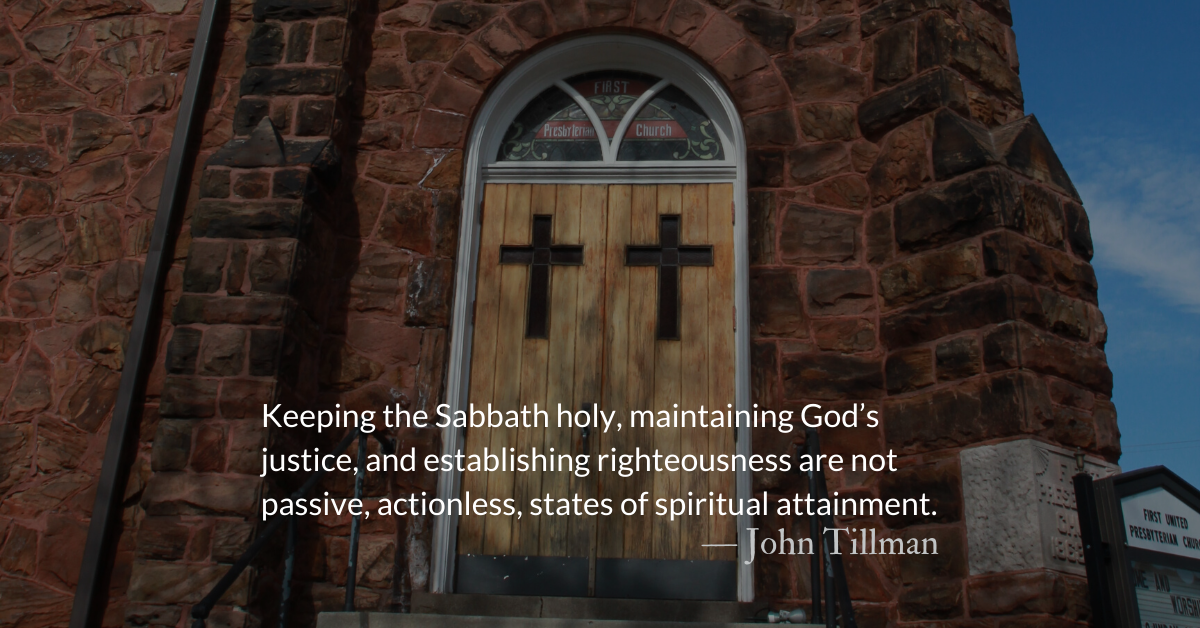Scripture Focus: Mark 3.2-6
2 Some of them were looking for a reason to accuse Jesus, so they watched him closely to see if he would heal him on the Sabbath. 3 Jesus said to the man with the shriveled hand, “Stand up in front of everyone.”
4 Then Jesus asked them, “Which is lawful on the Sabbath: to do good or to do evil, to save life or to kill?” But they remained silent.
5 He looked around at them in anger and, deeply distressed at their stubborn hearts, said to the man, “Stretch out your hand.” He stretched it out, and his hand was completely restored. 6 Then the Pharisees went out and began to plot with the Herodians how they might kill Jesus.
Reflection: Stretch Out Your Hand
By John Tillman
The man with the shriveled hand seems to be there only so the leaders can see if Jesus will break one of their interpretations of Sabbath law. It’s a trap recorded by three different gospel writers. (Matthew 12.9-15; Mark 3.1-5; Luke 6.6-11)
Mark focuses on Jesus’ inner frustrations. Jesus is angry that the leaders’ hearts are so hardened that they cared more for a human interpretation of the law than a human life.
Jesus called Pharisees “teachers” of Israel. He said, “Do what they say.” They were good teachers but bad leaders. Their lives did not reflect their own teachings, so Jesus also said, “Don’t do as they do.” (Matthew 23.3)
Jesus’ ministry had barely begun but already, they sought “a reason to accuse” rather than reasons to believe. Many people we meet may also be looking for reasons to accuse, reasons to doubt, reasons to deny faith. Some of those reasons may be found in how they are treated by the Pharisees of today.
In Jesus’ day and in ours, those who are wounded or who suffer in life are often not treated well. Sometimes, like the man with the shriveled hand, they are used as props in arguments. Often they are viewed with suspicion by the religious, the comfortable, or the wealthy. The prevailing logic, a form of prosperity gospel, says that sickness, anxiety, or any kind of struggle is caused by sin. Those stricken by these things are often assumed to be of poor character. At times they are told to “pray” their problems away or are forced to jump through hoops to obtain any assistance or acceptance.
Jesus gives us a different example. He gives every person, even his enemies, every opportunity to believe. All he says to the man at the center of this trap is, “stretch out your hand.” When he does, the man is healed. Both Matthew and Mark tell us that after this, Jesus leaves and many other sick people follow him and he heals them.
Forgiveness and healing are often tied together in scripture. (Psalm 103.3; Isaiah 19.22; Jeremiah 3.22) So bring to Jesus your wounded friends. Encourage them to look for a reason to believe. Regardless of their sins and regardless of what the religious elite will say, to all who stretch out their hands to Jesus, he offers forgiveness and healing.
Divine Hours Prayer: The Call to Prayer
Open my lips, O Lord, and my mouth shall proclaim your praise. — Psalm 51.16
Today’s Readings
Genesis 25 (Listen 4:18)
Mark 3 (Listen 3:41)
Read more about Keeping the Sabbath by Action
To Jesus, keeping the Sabbath holy meant staying in step with God’s Spirit and leaving nothing undone that the Spirit commanded.
Read The Bible With Us
It’s never too late to join our Bible reading plan. Immerse in the Bible with us at a sustainable, two-year pace.
https://mailchi.mp/theparkforum/m-f-daily-email-devotional










